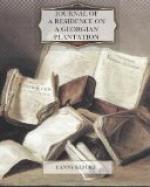But of what value will be such conclusions applied to those numerous plantations where no white man ever sets foot without the express permission of the owner? not estates lying close to Baltimore and Charleston, or even Lesington or Savannah, but remote and savage wildernesses like Legree’s estate in ‘Uncle Tom,’ like all the plantations in the interior of Tennessee and Alabama, like the cotton-fields and rice-swamps of the great muddy rivers of Lousiana and Georgia, like the dreary pine barrens and endless woody wastes of north Carolina. These, especially the islands, are like so many fortresses, approachable for ‘observers’ only at the owners’ will. On most of the rice plantations in these pestilential regions, no white man can pass the night at certain seasons of the year without running the risk of his life; and during the day, the master and overseer are as much alone and irresponsible in their dominion over their black cattle, as Robinson Crusoe was over his small family of animals on his desert habitation. Who, on such estates as these, shall witness to any act of tyranny or barbarity, however atrocious? No black man’s testimony is allowed against a white, and who on the dismal swampy rice-grounds of the Savannah, or the sugar-brakes of the Mississippi and its tributaries, or the up country cotton lands of the Ocamulgee, shall go to perform the task of candid observation and benevolent enquiry?
I passed some time on two such estates—plantations where the negroes esteemed themselves well off, and, compared with the slaves on several of the neighbouring properties, might very well consider themselves so; and I will, with your permission, contrast some of the items of my observation with those of the traveller whose report you find so satisfactory on the subject of the ‘consolations’ of slavery.
And first, for the attachment which he affirms to subsist between the slave and master. I do not deny that certain manifestations on the part of the slave may suggest the idea of such a feeling; but whether upon better examination it will be found to deserve the name, I very much doubt. In the first place, on some of the great Southern estates, the owners are habitual absentees, utterly unknown to their serfs, and enjoying the proceeds of their labour in residences as remote as possible from the sands and swamps where their rice and cotton grow, and their slaves bow themselves under the eye of the white overseer, and the lash of the black driver. Some of these Sybarites prefer living in Paris, that paradise of American republicans, some in the capitals of the middle states of the union, Philadelphia or New York.




